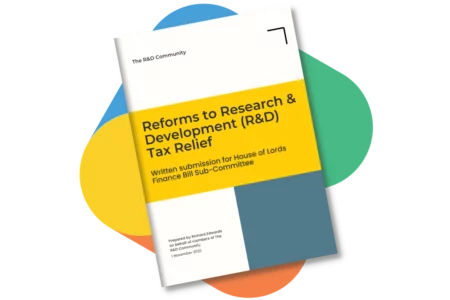Consultations give us key information about what changes to anticipate. In this competitive field, up-to-date information can help reassure and persuade clients.
The Government released draft legislation in July 2022, which will come into effect for claims beginning on or after 1st April 2023. Parts of that draft legislation are controversial.
The House of Lords’ Finance Subcommittee Inquiry into R&D Tax Relief
In November last year, the Finance Subcommittee of the House of Lords was tasked with assessing the impact of the draft legislation. But they didn’t stop there. They invited views not just on the legislation but also on the scheme as a whole and its implementation by HMRC.
While witnesses were giving evidence in the inquiry, The Times published several articles highlighting instances of fraud and error in the SME scheme. Shortly after, in his Autumn Statement, The Chancellor cut the rates for R&D relief for SMEs. It felt very much like a knee-jerk reaction, although the Government said it wasn’t. Instead, the Government described it as a move to balance the rates of RDEC and the SME scheme. Meanwhile, their longer-term goal seems to be to create a single combined scheme – more on that later.
The Subcommittee released their report in January 2023. You can read our summary and our thoughts on its contents.
Draft guidance on the April 2023 legislation
In December 2022, the Government published draft guidance to support the incoming legislation. The consultation on the guidance was open until 28 February.
We shared our initial thoughts on the draft legislation back in January. You can also download our response to the consultation.
Because this draft guidance came out before the Lords’ report, the Subcommittee was able to comment on it. Their most pointed questions were
- why did it take 5 months for HMRC to produce 10 pages of guidance?
- how can advisors work effectively when given so little time to prepare?
Proposals for a combined R&D scheme
Following hot on the heels of the draft guidance came another Government consultation. This one floated plans to create a single R&D scheme for both SMEs and Large Companies. It closed on 13 March 2023.
Once again, we shared an overview of our thoughts on the consultation and the full text of our response to the consultation.
What can we learn from these consultations?
A couple of thoughts to put this in context.
Many people were disappointed by the brevity and quality of the draft guidance. Perhaps splitting their time between these two projects didn’t do the Government any favours. Plus, if they’re planning to replace or revise the guidance again in another year, they have little incentive to get it perfect now.
Secondly, the way the consultations have been timed or phrased suggest that the Government already has a pretty clear idea of what it’d like to achieve. For example, the last-minute nature of the guidance consultation doesn’t leave much time for taking onboard feedback. In the combined schemes consultation, the questions are all fairly closed, and the timelines are again going to be tight. These are not fertile grounds for open, collaborative discussion with taxpayers!
Unless the Government takes the recommendations from the Lords’ Subcommittee, don’t expect them to change their course by much.
Raising standards in tax advice: protecting customers claiming tax repayments
There’s one last consultation we want to draw your attention to, although it’s not strictly about R&D tax relief. Over the summer in 2022, the Government ran a consultation on standards among tax repayment agents. They were mainly interested in agents working in income tax, but R&D tax relief was also mentioned.
In the consultation, people reported problems with a minority of income tax agents who:
- Misrepresent their service or hide details of their terms & conditions
- Misrepresent or overstate their relationship with HMRC
- Use assignments to transfer the client’s tax benefit to themselves
- Use misleading marketing and high-pressure sales tactics
- Charge very high contingent fees
An interesting line from the summary was this:
HMRC has frequently seen cases where repayment agents have pushed the boundaries of eligibility, exploited customers or made fraudulent claims.
For anyone working in R&D tax relief, it all sounds very familiar, doesn’t it?
Based on the feedback received, the Government intends to:
- Introduce legislation to void assignments of repayments
- Require agents to register with HMRC
- Strengthen checks on repayment agents, and
- Explore introducing pre-contract disclosure forms.
While these actions are aimed at agents working with income tax repayments, it seems almost certain that R&D advisors will also be affected. No doubt even more change is on the way!
What’s coming next?
We’re not anticipating any new consultations in the next few weeks and months. We expect the next one will come with the draft guidance for the new combined R&D scheme – should it come to fruition.
If you want your thoughts and opinions to be included in our submissions, you can join The R&D Community (and get lots of other benefits besides!) If you’re keen to stay in the loop, make sure you sign up to our mailing list, and follow us on LinkedIn.





